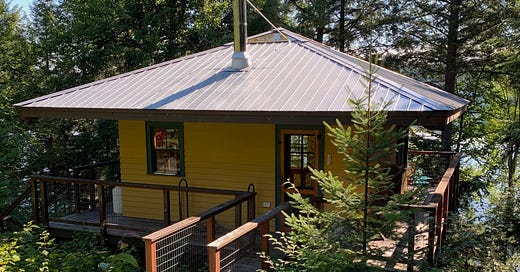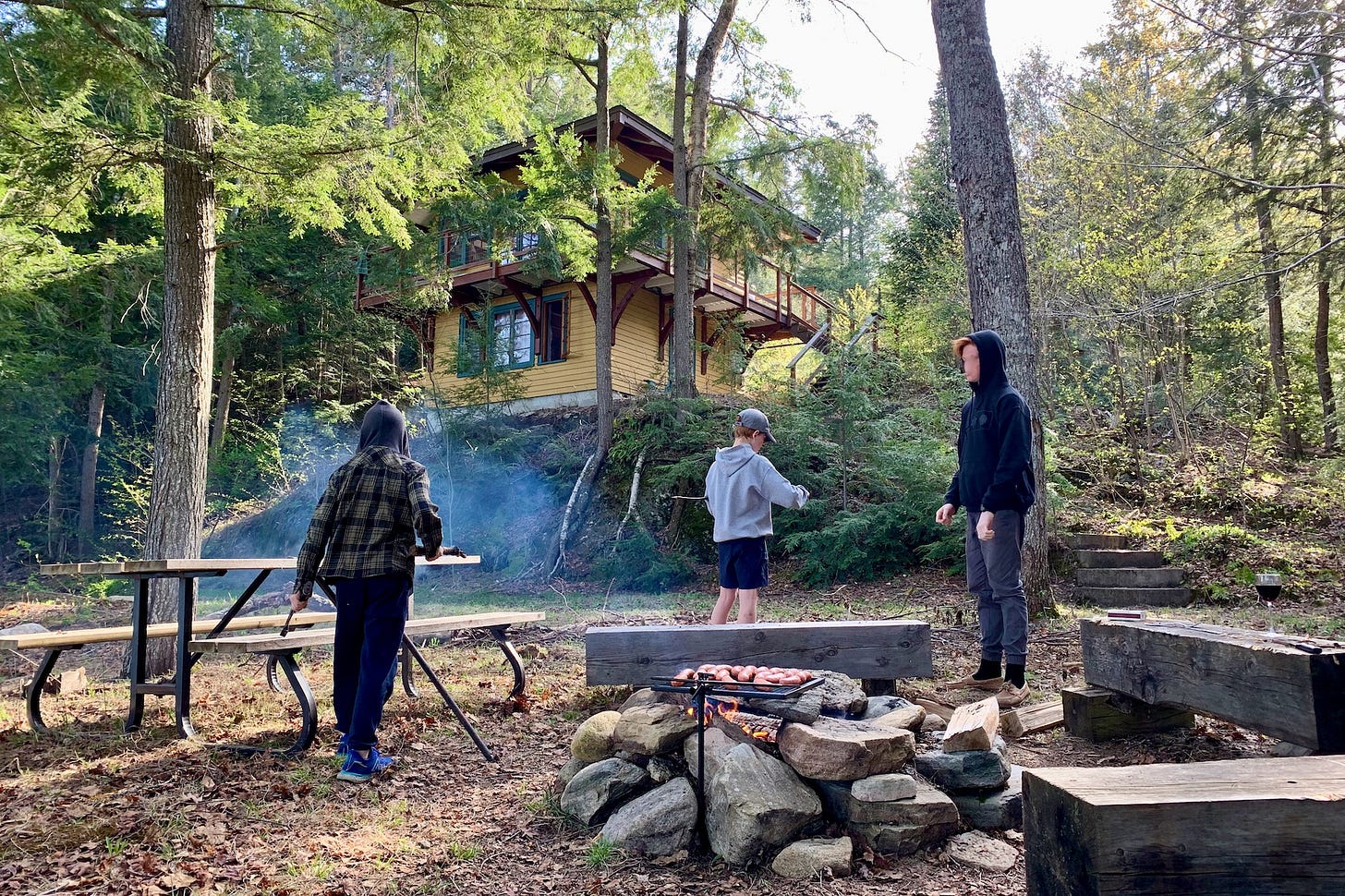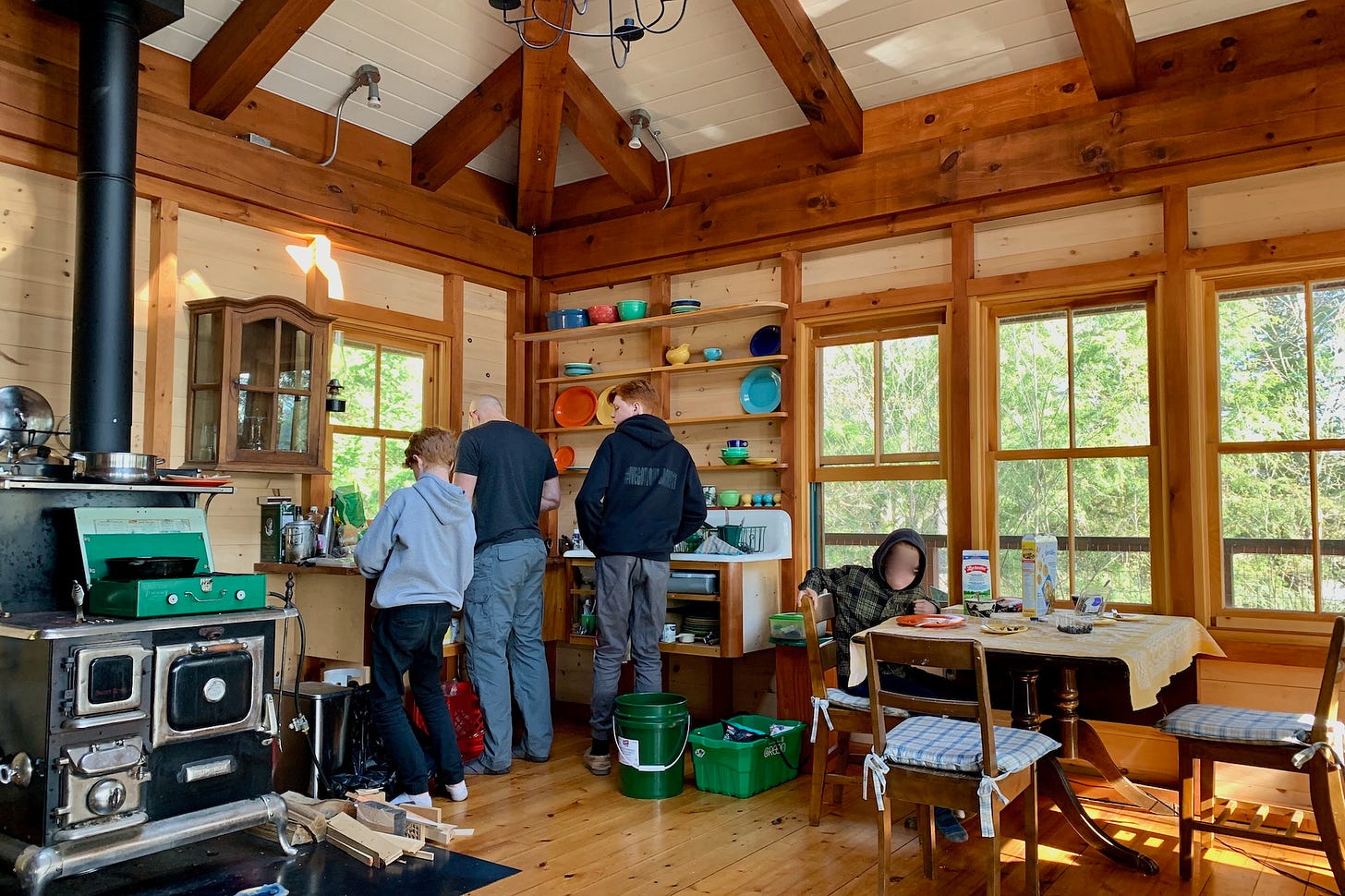This past weekend, my family and I escaped to the wilderness. We made our annual early-May pilgrimage to my parents’ off-grid cabin in Algonquin Highlands, a region of Ontario that’s famous for its countless pristine freshwater lakes, towering white pines, and granite outcroppings. Picture an iconic scene painted by Canada’s famous Group of Seven, and that’s what the region looks like. It’s also where I grew up, so going there feels like going home.
My childhood home is on a lake about 30 minutes away from the cabin, and my parents still live there year-round. By most people’s standards, their residence is already in a very remote setting, but for them, it was starting to feel “too busy and congested,” hence the decision to build a tiny, rustic timber-frame cabin in an even more remote setting. It’s a work in progress, but over the years it has become a favourite spot of ours to visit. While we go regularly throughout the summer and fall months, I always like to squeeze in a visit right before blackfly season starts in May. We got lucky this past weekend—sunny weather, a light breeze, and not a bug in sight.
The cabin is built like a tower on a hill—just two rooms, stacked on top of each other. Downstairs is the dormitory, with bunkbeds and two queen-sized beds to sleep 7 people comfortably. Upstairs, with a wraparound deck and spectacular views of the lake and cliffs, is the open-concept kitchen, living room, and dining room. There’s an outhouse up the hill and an outdoor shower. Several years ago, Dad upgraded the cabin with solar-powered electricity and a water heater, which makes washing dishes and showering much more pleasant. There’s a propane camp stove and a wood stove for cooking and heat. Down the hill, there’s a campfire spot and a dock and several canoes. Cell reception is spotty; we used to get none at all until a new tower was built nearby. But it’s not a problem, because usually I set my phone to airplane mode as soon as I arrive.
I haven’t felt so relaxed in a long time. All day Saturday, I sat in the sun and read my book (The Power of Fun: How to Feel Alive Again by Catherine Price, in case you’re wondering), drinking coffee and snacking on the food I’d packed, looking up every so often to watch the sparkling lake and listen to the birds in the trees around me and interact with my kids, who were hard at play. We ate delicious meals—sausages and potatoes cooked over the fire, eggs Benedict for Mother’s Day breakfast, grain salad, brownies, and more.
The boys spent the entire weekend stalking grouse in the forest with their bow and arrows and BB gun. They never caught anything, but they did figure out where one particular grouse lived and kept going back in hopes of capturing it. It taunted them with its wing-thumping and impudent stares—they found it drinking out of a pond and later prancing across a log, but always came back empty-handed. I was relieved, of course, not wanting to deprive a wild grouse of its nice forest life, but also pleased that my kids were roaming the bush, doing what kids have done for centuries. We went over a few basic orientation details, like where the lake and neighbouring road were in relation to the cabin, and what they should look for if they get lost, but I wasn’t worried. The rest of the time they whittled sticks and built fires, which kept them gloriously occupied, interspersed with several rounds of The Settlers of Catan.
At night we fell asleep to the chorus of spring peepers, tiny frogs that fill the air with their steady chirping (quite possibly my favourite sound in the whole world, apart from the loons, which haven’t arrived on the lake yet), and gaped at the stars that were bright and spectacular. We tried out the canoe I bought my husband for Christmas, loading all the kids into it and heading through a moose pasture (no moose, lots of peepers) and over to the huge granite cliff that faces our cottage. The water was rough and choppy, and I worried about what would happen if we flipped; it’s only been a few weeks since the ice went out. But fortunately we didn’t have to deal with that scenario.
We’ve done a lot of tent camping as a family, both in a car and canoe, but I prefer the cabin to everything else. It’s so much easier than camping, at least for me, as Chief Family Organizer (you can call me the CFO). It has comfortable beds and warm duvets, shelter from the rain and bugs (and bears!), easy-to-use cooking facilities, and a hot outdoor shower; and yet, it comes with all of the benefits of camping, like campfires, swimming, canoeing, and fishing (and grouse-hunting potential).
What If…
When my oldest son and I went for a walk on Sunday morning, I told him about this fantasy I sometimes have where I imagine what if we had to stay here forever. Ignoring questions about access to work and education and food, I like to picture how it would feel if this became our entire world—a tiny cabin in the bush, minimal amenities, no one but ourselves and our minds to entertain us. And I marvel at the fact that most people did live like that, once upon a time; that my own pioneering ancestors would have lived in cabins far more humble than this, struggling to eke their survival out of the soil; and that I am where I am in the world because of them.
It also makes me think about how my parents essentially did that, uprooting their own city-based life and professional jobs in the late 1980s to move to a 400-square-foot cabin in the woods (on the site of their current residence) where they raised me and my sister when we were babies. While they did have a town and school nearby, it still must have felt like a move into the middle of nowhere.
No doubt such a move would bring a family close together—there’d be a sense of profound dependence on each other—and many of the broader concerns about the world would simply fall away because they’d feel totally irrelevant. (That’s another thought I often have, how easy it is to get caught up in issues that have minimal to no bearing on my life, just because constant screen-based exposure makes them seem important.)
We are not going to move into the bush anytime soon (or likely ever), but I do acknowledge a primal draw that I feel to being in the wilderness, in that little cabin where there’s nothing to do or distract, just a place to be.
The Allure of Cabin Life
Apparently, I’m not the only person who feels this way. I was fascinated to read about Norwegian cabin culture in Linda Åkeson McGurk’s book The Open-Air Life. She says that roughly 25% of Norwegians own a rustic hytte (“small, humble wooden house”) and more than twice as many have access to one through extended family. These are not fancy, usually built out of logs with a sod roof. She writes, “As late as 2017, only four out of ten cabins in Norway had running water.” People go to them to escape chores and technology and to reconnect with nature, which (many of us know) has a powerfully rejuvenating effect.
“The cabin is where Norwegians go to escape Wi-Fi-induced stress and to live out their dreams of a simply life, by fetching water from a well, heating canned food on top of a woodstove, and plodding through three feet of snow to do their business in a wooden outhouse with a heart-shaped hole in the door and yellowed pictures of the royal family on the walls.”
My parents did a marvelous job designing their cabin, but I have to say that one of the most design-forward choices was to put a half-height door on the outhouse. At first glance, it disconcerts visitors, but once you use it and realize that you can achieve privacy while also enjoying the view and not feeling claustrophobic, the whole experience is much improved. (That, of course, only happens after my husband has dutifully de-spiderified the entire outhouse with a broom. I am still slightly traumatized from the two dock spiders living under the toilet seat whose eyes reflected back the light from my flashlight and sent me shrieking back down the path. But these things build character, right?)
I feel profoundly lucky to have access to our little Canadian hytte in the woods. The boys suggested we name it “The Bird’s Nest” because of the view from up high. I love being back home in the forest, surrounded by such beauty; but even more, I love the feeling of togetherness that comes from escaping superfluous distractions and focusing on just being together.
You might also like: Meet Raven, Purveyor of Warmth







Idyllic!! : )
Our outhouse on Shoe Lake has always had Dutch doors. So much better.